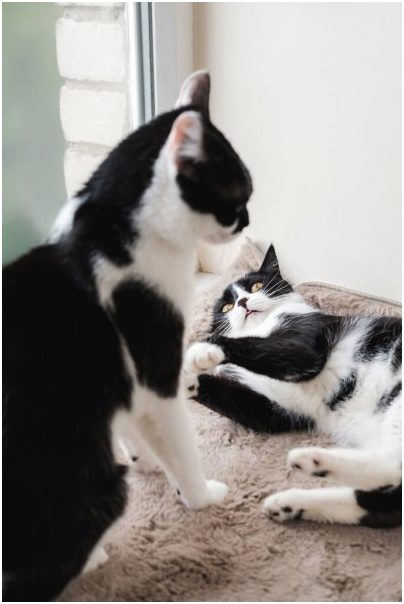Cats are creatures of mystery—or inconsistency. One day, they might be purring and lavishing you with rare affection, the next, they might pass by you as if you didn’t exist. Whatever your little feline’s personality may be, there is always a base or normal behavior every cat follows. And according to the list (read more), growling is not one of them. This behavior often precedes hissing or yowling, which are also two behaviors not listed as usual.
But don’t be alarmed! While growling is considered an abnormal behavior, you as an owner should take it as a sign that something is wrong instead. Being familiar with cat language isn’t easy, but you can learn with a little guidance and observation. Why is your cat growling? Here are some possible reasons why.
1. They Might Be Scared Of Something
The most common reason a feline will growl is its instinctive tendency to protect itself, thus, it bends down, takes on a defensive stance, and growls. However, growling doesn’t always mean the recipient of their fear is something we can see. Cats have more enhanced senses than we do, and sometimes they detect creatures or people farther away than our eyes can see. It’s also debated that cats can see the supernatural, hence, their growling at seemingly nothing.
2. It Can Mean A Warning
Other than fear, cats growl to let the other party know they need to back-off or a fight will ensue. This can be against a fellow cat, a dog present in the home, or a human they don’t particularly like (now this is one phenomenon we can’t explain!) Growling doesn’t always follow a physical attack unless the other party moves first. Often, the stance your cat can take is either a defensive one, with folded ears, bent body, a LOT of tail swishing, with often constricted pupils.
However, it can also take an alarming stance, with ears moving rapidly to detect the sound, bristled fur, and eyes darting everywhere. This happens when they see danger before it happens, and usually what undomesticated cats do before while scouring an area and finding a foe. They don’t usually act upon violence unless the feline has been brought up troubled without a proper home.
3. They’re Angry Or Annoyed
If you’re anti-cat, you might think felines are often angry and annoyed. But cat lovers and owners will tell you that cats use a calm, indifferent mask to hide their real feelings most of the time. They rarely react with enthusiasm or even emotion compared to their counterparts (the canines). And most importantly, no cat will willingly attack you if you haven’t attacked it first.
A cat can push its owner away if given unwanted affection. However, if a cat is growling or hissing, it means something worse happened, and it’s more than just merely getting affectionate with your feline.
4. They Want You To Know Who’s Boss

Often, cats are territorial, mostly when they’ve occupied a space their entire life, or have been with a human since they were a kitten. This behavior (link: https://www.aspca.org/pet-care/cat-care/common-cat-behavior-issues/aggression-cats#:~:text=Cats’%20territorial%20aggression%20is%20usually,chin%20rubbing%20and%20urine%20spraying) can be directed to both fellow cats, dogs, or even a human. They do this by patrolling, rubbing their bodies against certain areas or people, and even urinating.
If another creature or human invades their space (in their perspective), cats can become aggressive and growl at them. They could also assert dominance by starting the fight themselves, and instead of a defensive stance, they appear taller and take the higher ground.
5. They’re In Pain
Just like how dogs whine when they get a cut and immediately lick around the area, cats react differently. They’re more reserved with their wounds unless they’ve come to trust you, so often you try to treat them (especially felines who lived in the streets and have no experience being with a human), they growl and hiss at you.
Another scenario this might happen in is your cat is telling you it’s in pain. Cat language tells us that growling can be one sign, other than meowing loudly or yowling. In fact, growling can signify that the pain has worsened and may indicate an immediate trip to the vet. This is important to note because some owners might hit or punish their cats for reacting in such a way. Never raise your hand against your pet and assess the situation first.
7. They Have A Lot Of Bad Experiences
This reason is especially true for cats that have been adopted from the streets or shelters. Remember that before they entered your safe and loving space, they were out in the cold, in constant danger, and scouring for food in trash bins to survive. They were almost always on high-alert and wary, a behavior that stuck with them even after they got adopted. And of course, you’re still a stranger to them, no different than the people passing by the street.
If they continue to growl at you, don’t think they’re rabid or disobedient. Adopted adult cats need more work to unlearn some of the survival instincts that are unneeded in your presence. Take time to befriend them, prove that this space has no danger by eliminating harsh sounds and strange smells. Most of all, wait for your cat to get affectionate with you. Don’t smother them with your presence, as they won’t translate it into affection anytime soon.

